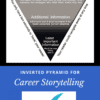“Résumés win interviews, but references win job offers,” says Martin Yate, author of the “Knock ‘Em Dead” series of career books.
Reference checks are important for both jobseekers and employers. References are a chance for employers to add to the information they learned from your résumé and in the interview — and what they find out from your references will either confirm their desire to hire you, or make the decision not to extend the job offer. A great reference will help the hiring manager feel good about their decision to hire you.
The definition of “reference” includes two important functions in a job search. According to the Merriam-Webster Dictionary, a reference is “a person to whom inquiries as to character or ability can be made.” A reference is also defined as “a statement of the qualifications of a person seeking employment or appointment, given by someone familiar with the person.”
Reference checks are often part of a comprehensive employment screening program, which can also include verification of employment eligibility as it relates to immigration status, credit checks, and background checks.
According to a 2010 Society for Human Resource Management (SHRM) survey, 76 percent of organizations conduct reference background checks for all job candidates. The survey defined “reference background checks” as verification of information provided by a job applicant or communication with people regarding the job applicant. This statistic did not include credit and criminal background checks.
Jobseekers applying for positions with access to confidential information (related to other employees or the company’s clients) were most likely to be subject to reference checks, as were candidates for financial positions, information technology jobs, and frontline/customer-facing positions.
Some companies will check your references; some won’t. You should prepare your references for the companies that do (as well as for the ones that ask for your references, but never use them).
The first step is identifying who you should consider choosing to be your references.
Selecting Your References
Generally, a potential employer will want at least two of your references to be former employers. The advantage of preparing your references is that you can take the upper hand and identify the “best” references and control who you offer the employer as your references. (You can provide your list of “preferred” references, in the order you’d like to have them contacted. That doesn’t guarantee that the prospective employer won’t contact people who aren’t on your reference list, but sometimes they will take what you give them.)
The best references can talk about your day-to-day job performance — so choose someone who supervised you or someone who worked with you closely.
Select someone who knows your work well. You want someone who has seen you in action and can speak to your abilities. It’s better to have someone who can speak to your skills and accomplishments than a “big name” on your list of professional references. If someone seems hesitant to serve as your reference, ask someone else.
Start Contacting Your References Early
The best time to start thinking about your references is when you’re putting together your résumé, not when you’re submitting applications. You shouldn’t wait until you’re getting called in for interviews to contact people you want to use as references.
It can take some time to track down and reach references, catch them up on where you’re at in your career, and obtain their contact information. You don’t want to try to do that while you’re researching and preparing for a job interview.
If you’re also asking your reference to provide a Recommendation for you on your LinkedIn profile, you don’t want all of your Recommendations coming in on the same date, or within two or three days of each other.
Also, having your references ready when they are requested shows professionalism. If your goal is to get a job, you should be ready to provide references when asked.
Getting Permission From Your References
Once you’ve decided who you would like to be your “preferred” references, always contact these individuals and ask their permission to use them as a reference. Call your references directly (don’t just email them). You may also consider scheduling an in-person meeting, if at all possible.
Keep in mind: Not everyone you’ve worked for — or worked with — will be a good reference for you. You want a reference that can be as enthusiastic about you as you are about getting the job. Not all potential references will be able to provide this kind of stellar recommendation. But some of your references may be hesitant to say no to you directly if you ask.
So you can give them a way to let themselves off the hook, without turning you down directly. Instead of asking, “Will you be a reference for me?” Ask them, “Do you feel you know me well enough to serve as a reference for me?” Or ask, “Will you be a great reference for me? (If the answer is anything less than enthusiastic, you can collect their information, but not list them on your “preferred” reference list. It’s perfectly fine to ask a reference to support you, but then not use them when applying to certain jobs, or not at all.)
Verify each reference’s contact information, including the preferred phone numbers (mobile, home, work) to list.
This is also an appropriate time to ask for a LinkedIn Recommendation. (Check and see if they are on LinkedIn first, as they will need a LinkedIn Account to recommend you.)
You also want to update them on what you’ve been up to (especially if they knew you at a previous job) and what you’re looking for in your next job.
Immediately send a letter or email thanking them for serving as a reference, and provide a current copy of your résumé (or let them know you will be sending them a copy of your résumé soon, if it is not yet completed).
This information has been provided by Carolyn from Total Resumes.

